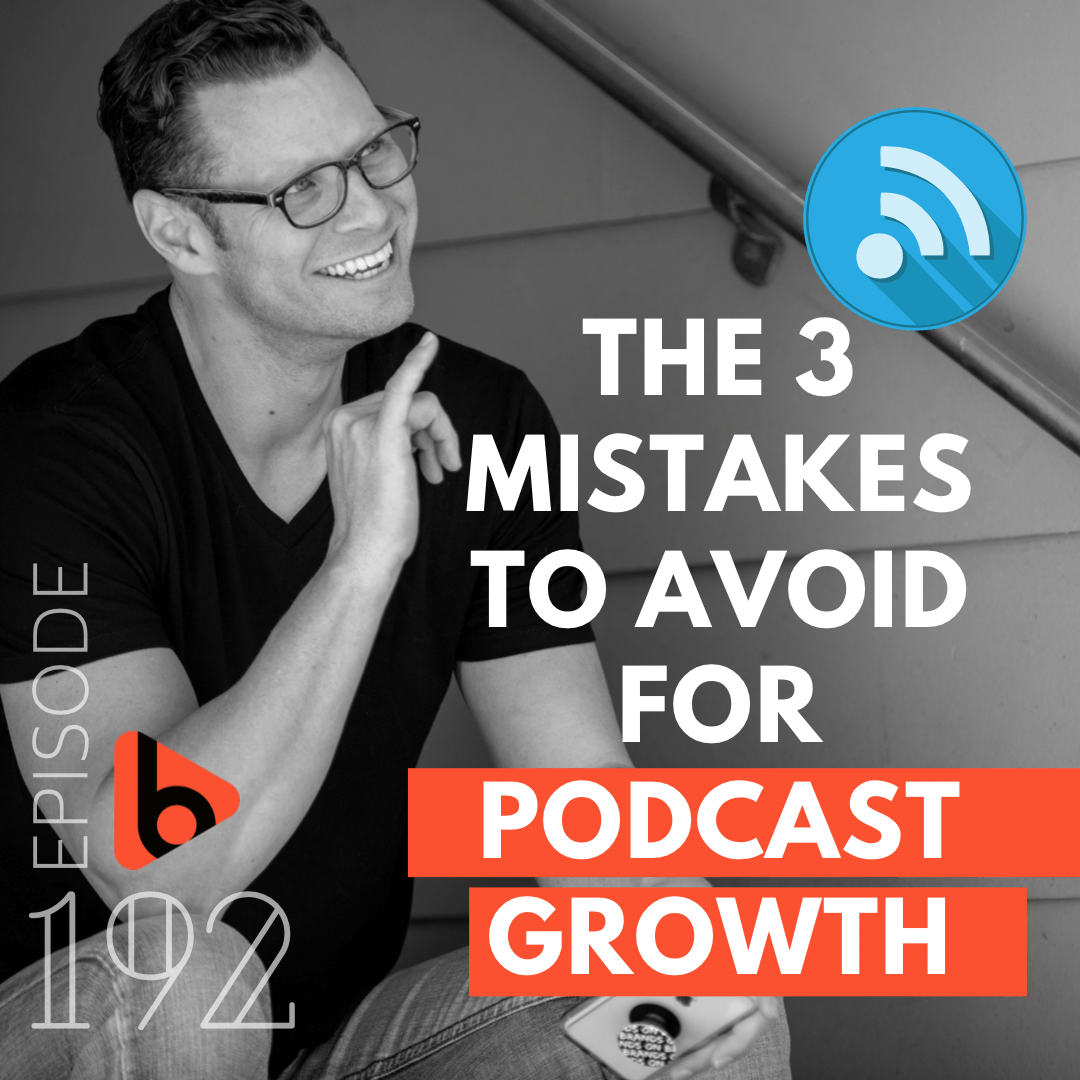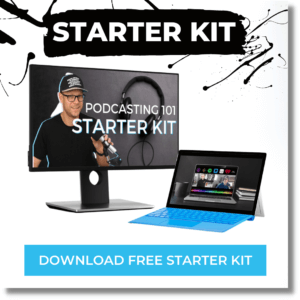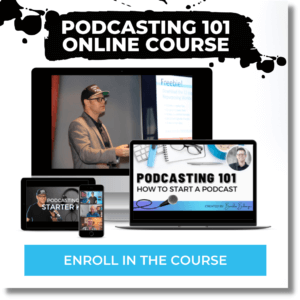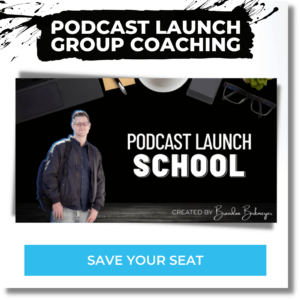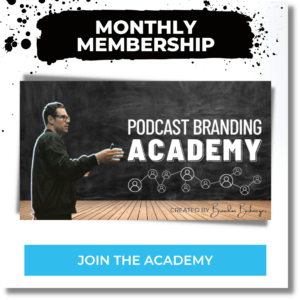This week we’re talking about the three mistakes to avoid for podcast growth.
As I have taken a look at what the best brands in the world do when creating content, what YouTubers are doing when they are growing their shows, what bloggers are doing when they are growing their blogs, and all content creators out there, these are lessons that they’ve been implementing in their businesses and in their content that I think podcasters could learn from.
BEST PRACTICE IDEAS FOR PODCAST GROWTH
Now, podcasting obviously has its nuance. It is different than these other places. I think it’s better. I think it’s a great place, a more natural place to create content, but there are some limitations, and growing our show is one of them.
It is a harder place to do that if we’re not following some of the best practices out there. I’m going to throw these ideas out there. None of these are judgments. This is advice that you guys can learn from, and maybe you can tweak and make small changes to your show to help you grow beyond where you’re at today.
These will just be the ideas. If you do want to dive deeper, you can always sign up for that Podcast Branding Academy to get into how to do these things in-depth. This will be a top-line lesson today.
Related: Click here to grab the FREE Podcasting 101 Starter Kit!
PODCAST GROWTH MISTAKE #1
There are three mistakes we’ll jump into. Number one using the wrong words. What I mean is a lot of the time, the words we use in our titles, the name of our show, the words we use in our podcast description, and the words we use in our episodes, sometimes those words are wrong.
What I mean by wrong is I mean they are not helping you get discovered by people looking for your content. These are lessons that you can learn if you’ve ever done blogs or YouTube. They call it keyword research, SEO (search engine optimization) and getting ranked on YouTube. All of those things are related to the words you use.
Every media channel does it differently. However, it does matter for all of them, including podcasts. Using the right words makes a huge difference.
COMPUTERS NEED SPECIFIC WORDS
Let me give you an example. If you are a show that’s about finance, and you name your show, Making Tomorrow Great, no one knows what that show is about. There’s nothing about that title that helps you understand that this show is about finance, especially for the computers that also have no sense of context.
They can’t look at the episodes and find out that that context is about finance. You need to put words that are relevant to your content in your title and the name of your show. The word “finance” should be right there. Now, if you are a subcategory of finance, like stocks, the word “stocks” or “stock market” or “investing” needs to be part of your title.

The words that people search for matter. The words that identify you as the exact topic that people are looking for matter. You can go on to tools like Semrush and do research about what words people actually search for. If you put “stock ticker”, that probably has fewer searches than the word “stock market”. Use those words that people actually search for.
RESEARCH KEYWORDS FOR PODCAST GROWTH
You can do a little research there. If you go to brandsonbrands.com/semrush, that will take you to a place where you can get a discount on getting a tool like that. It is an affiliate link, so you’ll know that that’s connected to me in some way, but that tool is there for you.
There are other tools out there too, one like Wordtracker, which is free. There are some free searches available there too. That will help you do that research, but finding those words and identifying what words matter for you in your category or in your subcategory is going to help you get ranked.
Now, where do you put those right words? Well, change them out in your actual show title. If your show was called, Making Tomorrow Great, I’m okay if that’s what you want to call it, but you could say Making Tomorrow Great with Investing or in finance or whatever it might be. Or you could say Making Tomorrow Great–Finance and Investing.
You have to include it, but you can maybe include it as a subtitle. It has to be there in the little title box of your podcast host that tells all the show tools what your show is called. That keyword is going to help you show up when people are searching for that word.
NICHE YOUR KEYWORDS AS WELL
That’s not enough. If you come up in a crowded category like finance, you might need to go a little bit more niche, like “investing” or “stock market” or something like that so that when people search for that particular sub keyword, you show up for that if the other one is way too impacted.
You have to find your niche in terms of keywords and try to show up in the search for those things by changing your title and then by changing the description of your show. Change your description to show what those words are in the description, right in the beginning, and then repeat it a few times along with other keywords you think people are searching for.

Let the machines and people know what your show’s about using your keywords, and then go in and beyond that. Include it in your episode names, in your episode titles and descriptions. Do a multi-part series that include those words, like a four-part series on the stock market.
Stock market investing, stock market analysis, stock market growth, whatever it’s called, do a four-part series and call it that thing over and over again. It starts to jumpstart the system in terms of knowing this is what the show is. Then try to include that word more often in all the things that you do.
PODCAST GROWTH MISTAKE #2
Using the wrong words is mistake number one. Mistake number two is random content. Now, this is kind of related to keywords, but it’s a step further. Once you know what your show is about, you have to start creating content that makes sense for that category or for that topic.
What we normally do is we have all these ideas of things people want to hear in our category, and we talk about all kinds of random stuff. That means that sometimes your content is about what your show is about and sometimes it’s not. There are a lot of sub-categories.
To our point about finance, if you did the stock market series of shows, but then you did other shows about budgeting your finances, how to talk to your family about money, and then others were about money mindset or about affordable travel, you start to jump around a lot. The show starts to become random.
STAY FOCUSED AND GROW
You could still have things like that. However, if you can take the majority of your stuff, the 80% if you will, and start to design what you want that show or season to be about, or what you want that group of shows or a season to be about, you’re going to be better off in terms of your focus.

If you do an entire 10 or 20 episodes or a season all within a general category or topic, that’s going to help you. Within the stock market, if you just said, “We’re going to do a season about stock trends, or we’re going to do a season about certain types of stocks,” then you can start to see how all that category of information is going to help start to group together.
Then you can say when you’re doing this what is the most important episode of that group of shows? Try to direct all attention in all of those shows towards that one episode. Say, “If you like this thing that we talked about today, make sure to go back to episode 100 or 200 and check out our most important episode on this topic.”
CORNERSTONE CONTENT HELPS PODCAST GROWTH
This lays down the foundation or is the ultimate guide to how to do whatever, or the first five steps to get started, whatever that episode might be. That way you are less random and you are more specific in saying, “Here’s where I want you to go listen to. Here’s the next, most important step. This is our cornerstone.”
If you Google cornerstone content, you’ll see that this is a practice that has been in place for a very long time for content marketing. It works for YouTube. It works for bloggers and it should work for podcasters too. We just don’t implement it the way they do.
PODCAST GROWTH MISTAKE #3
The last mistake, number three is being one channel-focused, being singular-minded in terms of the media we create. Now, I’ll probably get some flack for this because what most people will say in the industry is to focus on one channel. Focus on just your podcasts.
What I think they leave out of that statement is “at first”. At first focus on just your podcasts so that you can get it right and that you understand what you’re doing, but that at first should be pretty short-lived.
FIND YOUR FLOW
If you can get your first 10 episodes out there and you understand what you’re doing, and you can get into a flow where you understand how to create content in batches and how to get ahead of your season, the next step should happen pretty quickly, where you can create the next set of processes to help grow your show.
You figured out your podcast creation processes. Now what? The “now what” is how do you take that podcast (which is singular in nature and is not the easiest place to get discovered) and push it into other channels where it is easier to get discovered, where all your work pays off with bigger audiences?

How do you turn that into snippets of social media content, and how do you turn that into video clips and blogs? Can you turn that into email content for your list? How do you turn that into a website? Repurposing your content is the next step.
LEARN HOW TO REPURPOSE YOUR CONTENT
When you only focus on one channel, what I see is people are lasered in on the next episode, the next episode, and it suddenly it’s two years and nothing has changed. No growth has happened. When you look beyond one channel and your goal is to start to layer on and grow, you start to take the benefits of that.
You start to see that this all works together as an ecosystem. The podcast is not your one channel. It is your creation hub, your focus for pulling the ideas and voice out of you in the fastest, most efficient way possible. This is the key that unlocks the rest of the things, but the rest of the things are what drive the audience growth.
Focusing on one channel, in my opinion, is a mistake. If you can avoid that, then you can get there. The challenge with this is figuring out how to convert podcasts into the rest of the things in an efficient way that doesn’t kill all your time. That Is the challenge. It takes time to understand your processes.
BONUS PODCAST GROWTH MISTAKE: DOING IT ALONE
Can you do it by yourself? Do you need help to take that on? Are there tools that can help you do it in a way that makes sense that still works on these other channels? The answer is yes to all those things. There are processes to follow. There are people that can help you at an efficient cost, and there are tools out there that can move these things along for you.
It takes a little bit of research, or you can talk to people who have done it. This is something I dive into in the Podcast Branding Academy. It’s something I’m very passionate about, that I speak on stages about. It’s what I coach people on one-on-one. If it’s something you want to learn, it’s definitely information we’re going to be talking about, sharing, and training on together in the Podcast Branding Academy.
If you get a chance and you’re interested in seeing what the information is to decide if this is for you or not for you, go to brandsonbrands.com/PBA and just leave your email. That’s all it takes. Leave your email and you’ll be on the list.
I hope you found that useful and I hope you guys are continuing to grow, not just your show, but also your brand.
MORE ADVICE AND INTERVIEWS
If you’d like more content about how to build your personal brand, check out my free Content Marketing Starter Guide.
- Don’t want to miss the next thought leader interview? Subscribe to the free B-team Insider Newsletter! And don’t forget to leave a rating and review on iTunes.
Talk soon!
4 Ways To Build Your Podcast Brand
Start Building Your Reputation Today. Take your knowledge out of your head and turn it into an influential podcast brand. Dramatically increase your industry reputation, reach a global audience, gain a passive income and impact people’s lives all over the world. Let me help you create and launch your podcast, grow your audience, and build a highly influential personal brand – the easy way!
Here are 4 ways that I can help you become a known leader in your industry:
